Washington:
One week from now, America will know who its next president will be. The battle between Kamala Harris and Donald Trump has become so intense that much of the country has been divided and polarized. Emerging as a significant group is that of Indian Americans.
The Indian American community, which numbers more than 5.2 million people eligible to vote, has emerged as a group that could swing the election in favor of one candidate or the other.
The Indian American community, currently the second largest immigrant group in the United States, has historically overwhelmingly supported the Democratic Party. But Republicans have long felt that community votes are important, and that’s why the party has changed its policies on the economy, social issues, and the management of bilateral relations between the United States and India.
The Indian-American community is in the spotlight this election, as Democratic candidate Kamala Harris, the first Indian-American candidate in American history, could be elected to the country’s highest office. It’s increasing.
As Indian Americans play an increasingly important role in elections in determining who becomes the next U.S. president and how that will shape the future of the United States, Extensive research was conducted by the Carnegie Group to understand how to vote.
investigation, results
The survey, conducted in partnership with research and analysis firm YouGov, found that while Republican candidate Donald Trump’s approval rating has also increased as the November 5 election approaches, Indian Americans remain solidly loyal to the Democratic Party. It turned out that it was supported.
The survey shows that from Kamala Harris’ perspective, 6 in 10 Indian Americans support the Democratic Party, but from Donald Trump’s perspective, 1 in 3 Indian Americans support the Democratic Party. It shows that they are more likely to vote for him.
The study also suggests that there is a significant gender component to it. “67% of Indian American women say they plan to vote for Harris, compared to 53% of men who say they plan to vote for Harris, which is significantly lower,” the report said. “22% of women intend to vote,” he added. While voting for Trump, a significantly larger share of men (39%) plan to vote for him. ”
The survey should also be a cause for concern for Democrats, as it shows that “47 percent of respondents identify as Democrats, down from 56 percent in 2020.” Over the same period, the share of Republicans has remained stable, while the share of independents has increased.
It also became clear that the Indian heritage factor did not necessarily apply to all candidates. Those surveyed found that Indian American Republicans such as Nikki Haley, Vivek Ramaswamy, and Usha Vance (wife of Republican vice presidential candidate J.D. Vance) received unfavorable reviews from Indian Americans. showed.
According to the survey, the highest rated issues among Indian Americans were “inflation” and “cost of living,” tied to “economic conditions” and “employment,” followed closely by “abortion and sexuality.” Reproductive Rights” followed.
research insights
This study focused on several interesting datasets and revealed the following:
There are currently approximately 5.2 million people of Indian descent living in the United States, 3.9 million of whom are 18 years of age or older. According to available data, there are currently an estimated 2.6 million Indian American voters in the electorate. Between 2010 and 2020, the Indian American community grew by 50%, making it the second largest immigrant community by country of origin. The median household income for Indian Americans is approximately $153,000, more than double the national income.
Here are some graphs showing the findings.





